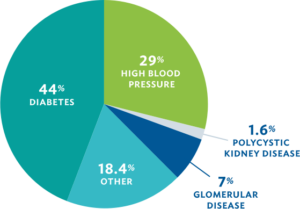What Is Kidney Disease
Kidney disease, also known as chronic kidney disease (CKD), occurs when the kidneys lose their ability to effectively filter waste and excess fluids from the blood. This can lead to the buildup of harmful toxins in the body, causing a variety of health problems. CKD often develops gradually over time, primarily as a result of underlying conditions like diabetes, high blood pressure, and other disorders that affect kidney function. Early detection is critical, as kidney damage is usually irreversible, but early intervention can slow its progression.
In the early stages of CKD, symptoms may be mild or even non-existent, making it difficult to diagnose without regular medical checkups. However, as the disease progresses, patients may experience fatigue, swelling in the legs and ankles, changes in urination patterns, and high blood pressure. Advanced stages of CKD can lead to kidney failure, requiring dialysis or a kidney transplant to maintain life. Proper management through medications, lifestyle changes, and dietary adjustments can help control symptoms and prevent further kidney damage.

Preventing or managing kidney disease involves controlling risk factors like high blood pressure and diabetes through a healthy lifestyle. Eating a balanced diet, maintaining a healthy weight, staying hydrated, and avoiding excessive use of medications that may harm the kidneys, such as non-steroidal anti-inflammatory drugs (NSAIDs), are all key preventive measures. Routine health screenings and monitoring kidney function are also essential for those at higher risk, such as individuals with a family history of kidney disease or those with chronic conditions affecting the kidneys.
What Are The Functions Of Healthy Kidneys
Waste removal: Kidneys filter and eliminate waste products and excess fluids from the blood through urine.
Fluid balance: They regulate the balance of water and electrolytes in the body.
Blood pressure regulation: Kidneys help control blood pressure by adjusting blood volume and releasing hormones.
Red blood cell production: They produce the hormone erythropoietin, which stimulates the production of red blood cells.
Acid-base balance: Kidneys maintain the body’s pH balance by regulating acids and bases.
Electrolyte balance: They manage levels of key electrolytes like sodium, potassium, and calcium.
Toxin filtration: Kidneys filter toxins and drugs from the bloodstream.
Bone health support: They convert vitamin D into its active form, helping to maintain healthy bones.
Types And Causes Of Kidney Disease
Kidney disease refers to conditions that impair kidney function, leading to various health issues, including the build-up of waste products in the body. The kidneys are responsible for filtering blood, balancing electrolytes, and managing fluid levels. When they are damaged or malfunctioning, the consequences can be severe. There are several types of kidney diseases, each with its own causes.

1. Chronic Kidney Disease (CKD)
CKD is a long-term condition in which the kidneys gradually lose their function over time. It progresses through stages, often going unnoticed until kidney function is significantly reduced.
Causes of CKD:
- Diabetes: High blood sugar can damage the blood vessels in the kidneys over time, making it the leading cause of CKD.
- Hypertension (High Blood Pressure): Increased pressure in the blood vessels can strain the kidneys and reduce their ability to filter properly.
- Glomerulonephritis: Inflammation of the tiny filtering units in the kidneys, called glomeruli, can lead to kidney damage.
- Polycystic Kidney Disease (PKD): A genetic disorder where cysts form in the kidneys, eventually impairing kidney function.
- Autoimmune diseases: Conditions like lupus can cause the immune system to attack the kidneys.
- Recurrent kidney infections: Frequent kidney infections (pyelonephritis) can cause scarring and damage to the kidneys.
2. Acute Kidney Injury (AKI)
AKI is a sudden decline in kidney function, often reversible if treated quickly. It typically occurs within a short period, such as a few days or weeks.
Causes of AKI:
- Dehydration: Lack of fluids can reduce blood flow to the kidneys, leading to acute damage.
- Severe infections: Conditions like sepsis can impair kidney function due to inflammation and low blood pressure.
- Medications: Some drugs, such as nonsteroidal anti-inflammatory drugs (NSAIDs), antibiotics, or contrast dyes used in imaging, can damage the kidneys.
- Kidney stones: A blockage in the urinary tract due to kidney stones can prevent proper urine flow, leading to AKI.
- Heart failure: Poor heart function can result in low blood supply to the kidneys, impairing their function.
3. Polycystic Kidney Disease (PKD)
PKD is a genetic condition where multiple cysts develop in the kidneys, causing them to enlarge and lose function over time. Herbal Treatment for Polycystic Kidney Disease can also be used for cure.
Causes of PKD:
- Genetic mutations: PKD is inherited in an autosomal dominant or autosomal recessive pattern. In autosomal dominant PKD, only one parent needs to pass the gene, while in the rarer autosomal recessive form, both parents must pass the gene for the condition to occur.
4. Glomerulonephritis
Glomerulonephritis involves inflammation of the glomeruli, the kidney’s filtering units. It can be acute (sudden onset) or chronic (gradual onset).
Causes of Glomerulonephritis:
- Infections: Streptococcal infections and other infections can trigger an immune response that damages the kidneys.
- Immune disorders: Diseases like lupus and IgA nephropathy can cause the immune system to attack the kidneys.
- Vasculitis: Inflammation of blood vessels can affect the small vessels in the kidneys, impairing their function.
5. Kidney Stones (Nephrolithiasis)
Kidney stones are hard mineral and salt deposits that form in the kidneys and can obstruct urine flow, causing pain and potentially leading to infection or kidney damage.
Causes of Kidney Stones:
- Dehydration: Insufficient water intake can lead to the formation of concentrated urine, increasing the risk of stone formation.
- Dietary factors: High intake of oxalates (found in spinach, nuts), salt, or protein can promote stone formation.
- Genetics: A family history of kidney stones increases the risk of developing them.
6. Urinary Tract Infections (UTIs) and Pyelonephritis
Infections in the urinary tract, particularly when they spread to the kidneys (pyelonephritis), can cause kidney damage if recurrent or severe.
Causes of Pyelonephritis:
- Bacterial infections: Often caused by Escherichia coli (E. coli), bacteria can travel up the urinary tract to the kidneys, leading to infection.
- Blockages: Kidney stones, enlarged prostate, or structural abnormalities can increase the risk of infection.
7. Diabetic Nephropathy
Diabetic nephropathy is a type of kidney disease specifically caused by uncontrolled diabetes, which leads to damage to the kidney’s blood vessels and filtering system.
Causes of Diabetic Nephropathy:
- High blood sugar levels: Over time, high glucose levels in the blood damage the small blood vessels in the kidneys, impairing their ability to filter blood effectively.
8. Hypertensive Nephropathy
High blood pressure damages the small vessels in the kidneys, reducing their ability to filter waste and regulate fluid balance effectively.
Causes of Hypertensive Nephropathy:
- Chronic hypertension: Persistent high blood pressure can cause scarring and hardening of the kidney’s blood vessels, leading to nephropathy.
Kidney Disease Symptoms And Herbal Treatments With Natural Remedies
Kidney disease occurs when the kidneys are damaged and can no longer effectively filter waste from the blood, leading to a build-up of toxins in the body. There are many types of kidney disease, including chronic kidney disease (CKD) and polycystic kidney disease (PKD). Early detection and treatment are crucial to prevent further kidney damage and complications.

Common Symptoms of Kidney Disease
- Fatigue: A constant feeling of tiredness due to the build-up of toxins in the body.
- Swelling (Edema): Swelling in the legs, ankles, and face due to fluid retention.
- Changes in Urination: Increased or decreased urination, or blood in the urine.
- High Blood Pressure: Kidneys help regulate blood pressure, so malfunctioning kidneys may lead to hypertension.
- Shortness of Breath: Fluid retention can lead to difficulty breathing or chest pain.
- Nausea and Vomiting: Build-up of waste in the blood can cause gastrointestinal issues.
- Loss of Appetite: Toxins in the body can cause a decrease in appetite.
- Skin Rash or Itching: The build-up of waste products can lead to skin problems like itching.
Natural Remedies for Kidney Disease
While kidney disease often requires medical attention, natural remedies and herbal treatments can help support kidney health and alleviate some symptoms. Here are some natural remedies:
- Dandelion Root
- Benefits: Acts as a natural diuretic, helping the body eliminate excess fluid and toxins. It also reduces swelling.
- How to Use: Drink dandelion root tea daily to promote kidney function.
- Nettle Leaf
- Benefits: Nettle leaf is rich in vitamins and minerals that help support the kidneys and reduce inflammation.
- How to Use: Take nettle leaf supplements or drink nettle tea to help cleanse the kidneys.
- Corn Silk
- Benefits: Corn silk is known to be a natural diuretic and can help reduce swelling and promote the elimination of toxins.
- How to Use: Corn silk tea is a traditional remedy for kidney issues. Drink it 1-2 times a day.
- Horsetail
- Benefits: Horsetail is a diuretic and can help flush out excess fluids while supporting kidney function.
- How to Use: Horsetail can be consumed as a tea or in supplement form.
- Ginger
- Benefits: Ginger has anti-inflammatory properties that may help reduce kidney inflammation and improve digestion.
- How to Use: Drink ginger tea or include fresh ginger in your diet to help alleviate symptoms of kidney disease.
- Turmeric
- Benefits: Turmeric contains curcumin, which has powerful anti-inflammatory and antioxidant properties. It may help reduce kidney inflammation and support overall health.
- How to Use: Add turmeric to your diet or take curcumin supplements, but consult with a healthcare provider if you have kidney disease as turmeric can also interact with certain medications.
Polycystic kidney disease (PKD) is a genetic disorder characterized by the growth of cysts in the kidneys, which can impair kidney function over time. Natural Remedies For Polycystic Kidney Disease just like Cranberry Juice, Omega-3 Fatty Acids, Garlic, Green Tea and Parsley can help alleviate symptoms and support kidney function.
Conclusion
Kidney disease is caused by factors like diabetes, high blood pressure, infections, and genetic conditions, leading to symptoms such as fatigue, swelling, and changes in urination. If untreated, it can progress to kidney failure. While herbal treatments like cranberry, dandelion root, ginger, nettle leaf, and turmeric may help support kidney function and reduce inflammation, they should be used cautiously and under medical supervision. Conventional treatment remains critical in managing kidney disease and preventing serious complications.
